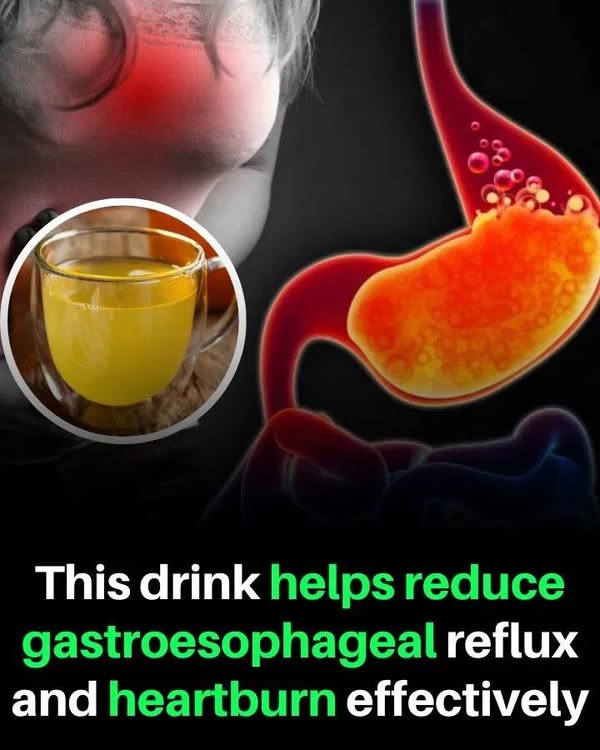
Causes and Management of Gastroesophageal Reflux
Causes of Gastroesophageal Reflux
GERD (Gastroesophageal Reflux Disease) is common, causing heartburn and acid reflux due to multiple factors.
- Excess Weight: It raises abdominal pressure, pushing stomach acid back into the esophagus, leading to reflux and gastritis.
- Poor Diet: Eating fatty, spicy, or acidic foods can make reflux symptoms worse.
- Stress and Fatigue: Chronic stress and fatigue reduce digestive enzyme production, causing digestive disorders and too much stomach acid.
- Unhealthy Lifestyle: Smoking, too much coffee or alcohol, late-night eating, and Helicobacter pylori infection can worsen acid reflux.
Drinks That Soothe Acid Reflux
- Warm Water: Hydration is key for those with stomach problems. Warm water relaxes stomach muscles, eases cramps, and stimulates digestive juices. Avoid cold or iced water as it may increase bloating and heartburn.
- Fresh Ginger Tea: Ginger has anti-inflammatory and anti-nausea properties. Steep fresh ginger slices in hot water and drink warm.
- Raw Potato Juice: A traditional remedy. Drink 100 ml in the morning for about 20 days for possible relief of acid reflux and help with ulcer healing.
- Aloe Vera Juice: Aloe vera has enzymes and salicylic acid that protect the stomach lining, reduce inflammation, and aid healing. Have one spoonful of aloe vera gel before meals to prevent reflux.
- Peppermint Tea: It aids digestion and can help some people prevent acid reflux. Drink warm peppermint tea after meals, but start with a small amount as it may not work for everyone.
Acid Reflux: Symptoms, Triggers, and Management
What is Acid Reflux?
Acid reflux, or heartburn or dyspepsia, is a common digestive issue. Symptoms range from mild pain to a burning in the chest that can reach the throat. Some also have an unpleasant mouth taste and bad breath. Reflux happens when stomach acid backs up into the esophagus. If it occurs often, it can damage and inflame the esophagus, and in severe cases, lead to conditions like Barrett’s esophagus, a pre-cancerous state.
How to Identify Reflux Triggers
Finding out which foods cause reflux can be hard as there’s debate on the worst offenders. Keeping a food diary helps.
- What to Include: Write down what, when, and how you eat, including all meals, snacks, caffeinated drinks, alcohol, and juices.
- Be Accurate: Write in real time.
- Food Details: Note how the food was prepared (boiled, grilled, etc.).
- Eating Circumstances: Were you stressed or relaxed? How fast did you eat?
- Symptom Record: Write down symptoms, when they occurred, and how long they lasted.
- Medications: Include any medications or supplements and when you took them.
- Duration: Keep the diary for at least two weeks, including weekends.
- Pattern Review: After two weeks, look for patterns related to your lifestyle or foods. Take the diary to your doctor or nutritionist.
Common Foods That Trigger Acid Reflux
- Fats and Fatty Foods: They take longer to digest, making more digestive juices. Alternative: Cut back on fried foods, chips, etc. Trim fat from meats, use cooking spray, and choose baking, steaming, or boiling over frying.
- Coffee, Chocolate, and Cocoa: Contain caffeine and other compounds that worsen symptoms, especially for sensitive people. Alternative: Switch to decaf and reduce chocolate and cocoa intake.
- Alcohol (Beer and Wine): Alcohol relaxes the sphincter muscle between the stomach and esophagus, and symptoms often start within an hour of drinking. Alternative: Choose low- or no-alcohol options.
- Tomatoes and Tomato-based Meals: Malic and citric acid increase stomach acidity. Alternative: Cut back on tomatoes and use other vegetable sauces for pasta or green pesto for pizza.
- Spicy Meals: Spices irritate the esophagus lining. Alternative: Avoid cayenne pepper, try ginger or cinnamon, and use a food diary to check your tolerance.
- Garlic and Onions: They stimulate gastric acid production. Alternative: See if cooked or milder onions (like red onions) are better for you.
- Citrus Fruits and Citrus Juice: Citric acid and low pH worsen reflux. Alternative: Choose cantaloupe, papaya, or banana. Ripe citrus has less acidity.
- Carbonated Drinks: They cause bloating, put pressure on the esophageal muscle, and may have caffeine. Alternative: Drink water, herbal teas, or diluted juices.
Conclusion
By dealing with reflux triggers and having stomach-friendly drinks, you can better manage gastroesophageal reflux and improve your digestive health.